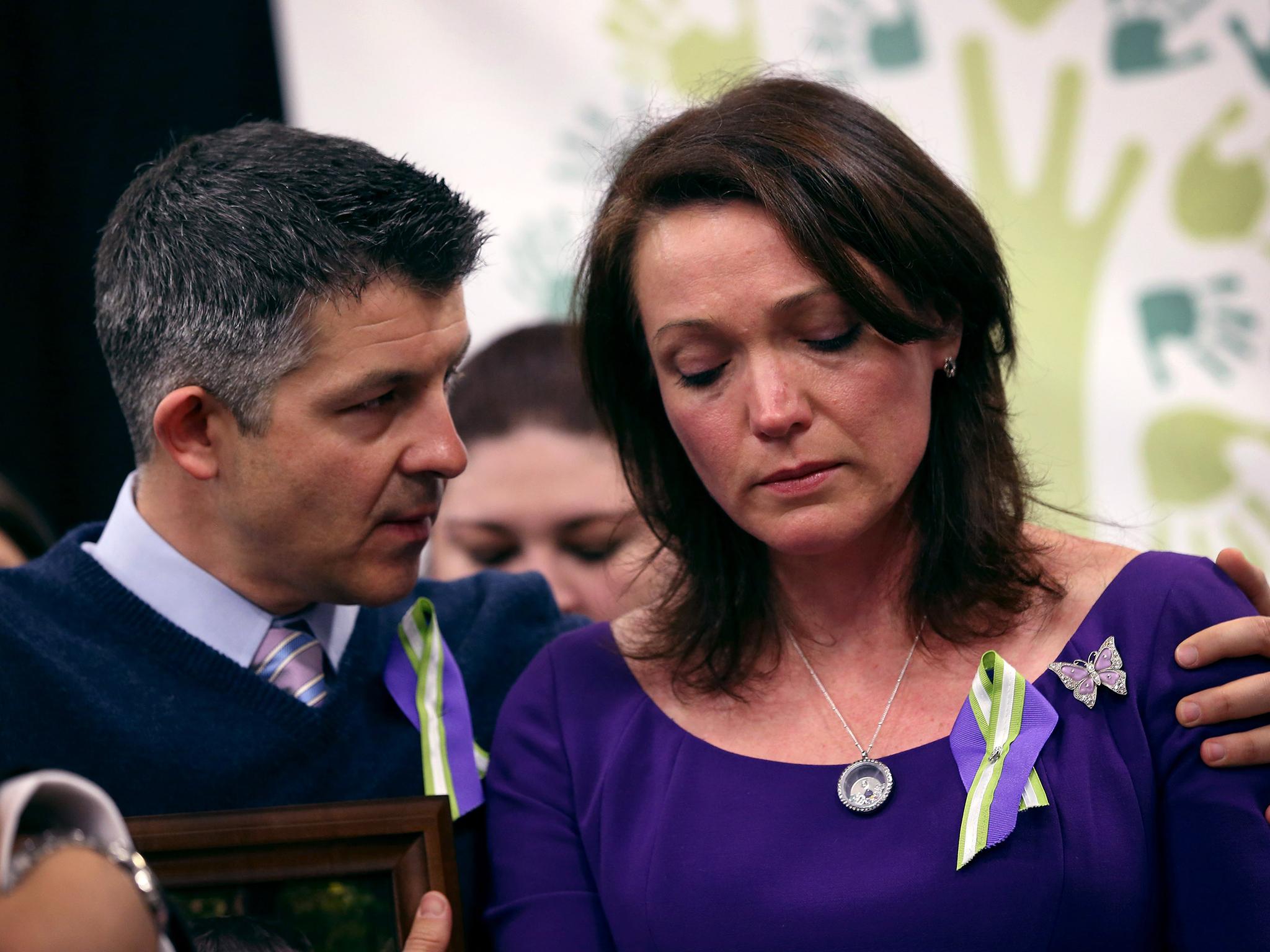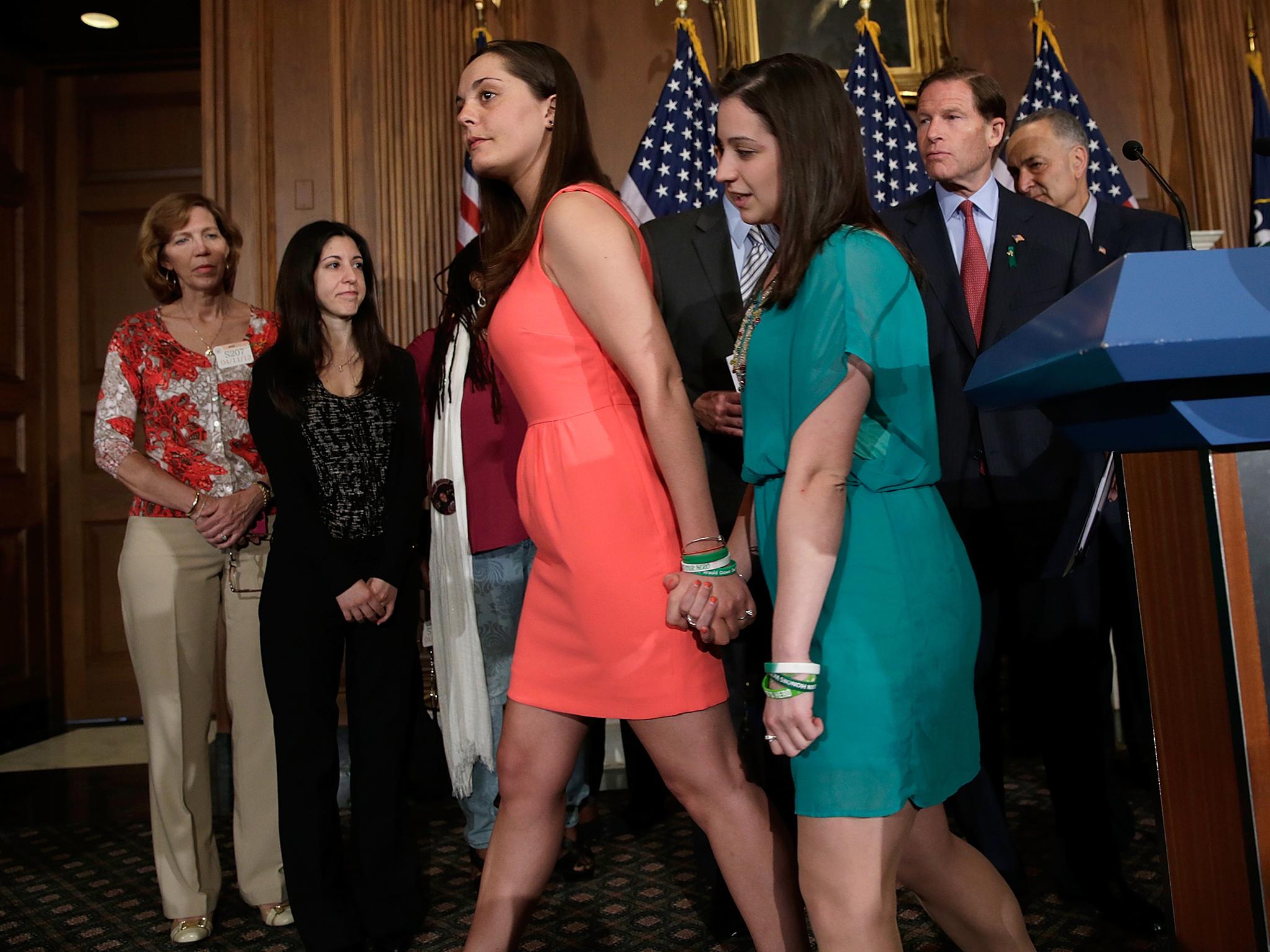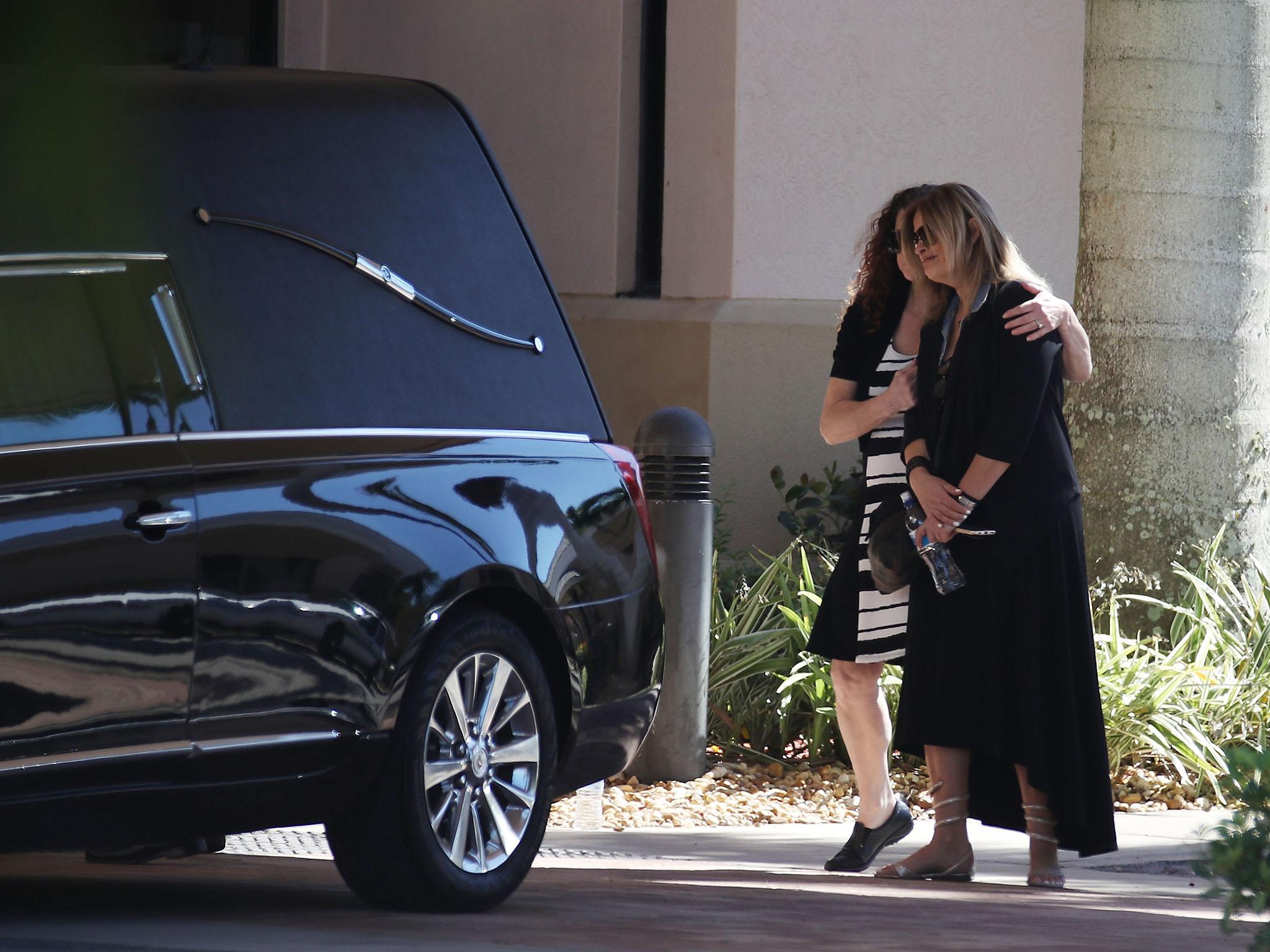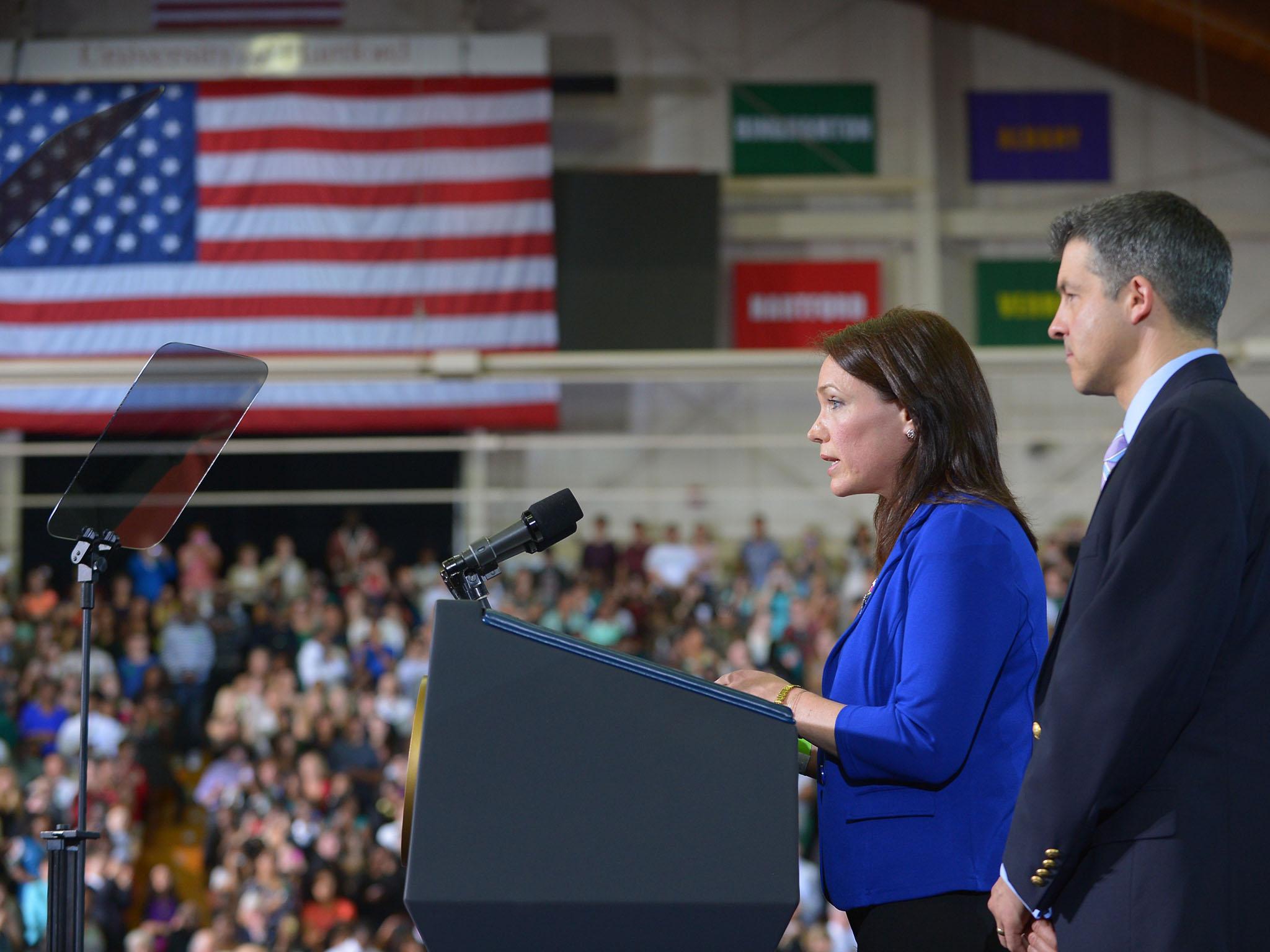For the families of US shooting victims, there’s a support network that keeps on growing
In the darkest time of a family’s life, the most valuable support often comes from those with shared experiences. As the mass shootings continue in the US, this is how victims’ loved ones have built a network for each other, often helping to bring new devotees to the gun-control cause

Your support helps us to tell the story
From reproductive rights to climate change to Big Tech, The Independent is on the ground when the story is developing. Whether it's investigating the financials of Elon Musk's pro-Trump PAC or producing our latest documentary, 'The A Word', which shines a light on the American women fighting for reproductive rights, we know how important it is to parse out the facts from the messaging.
At such a critical moment in US history, we need reporters on the ground. Your donation allows us to keep sending journalists to speak to both sides of the story.
The Independent is trusted by Americans across the entire political spectrum. And unlike many other quality news outlets, we choose not to lock Americans out of our reporting and analysis with paywalls. We believe quality journalism should be available to everyone, paid for by those who can afford it.
Your support makes all the difference.A child is shot to death. Maybe at school, maybe at the movies. It is all over TV, all over Twitter, just like the last mass shooting.
Then the cameras go away, and the parents are left in a wilderness of heartbreak. They do not know how to plan a funeral, where to get a therapist. They’re not aware that scammers will try to fundraise off their grief, that conspiracy theorists will question their tragedy, or that – hard to believe – they might, eventually, be OK.
But lots of people do know.
“When we had this happen to us, had our daughter slaughtered, we didn’t know what to do, or what was going to happen next,” says Sandy Phillips, whose 24-year-old daughter, Jessica Ghawi, was one of the 12 killed in the cinema shooting in Aurora, Colorado, in 2012. “We didn’t want to live. It was horrific. And nobody else understood, except other survivors.”
So it is that Phillips and her husband, Lonnie Phillips, are raising money to travel to Parkland, Florida, where the Phillipses will quietly let the families of 17 of America’s latest victims of mass gun violence know that they are there to listen, to advise, to hug, to cry, and, perhaps, to recruit them to the ranks of the most committed gun-control activists in the country.

The mass shootings of recent years, the proliferation of grief from rural Oregon to the tip of Florida, have forced hundreds of family members into an unwanted fellowship. Veterans like the Phillipses serve as guides in the immediate aftermath, introducing the bereaved of Sandy Hook to those of San Bernardino and the parents of Virginia Tech to those of Roseburg, in a loose but growing network.
Some mourn in private. Some confront politicians, join gun-control groups and flock to rallies. But whether they turn to advocacy or not, many gravitate towards one another, checking on each other by Facebook or phone whenever another shooter strikes.
In a gun-control debate that often splinters along ideological lines, no one speaks more powerfully than those who survived a high-profile shooting, or the families of those who did not. The power of their testimonials goes beyond their authenticity: they, unlike politicians and advocates, can usually avoid the accusation that they are politicising a tragedy.
Recognising the emotional heft of such stories, groups like the Brady Campaign to Prevent Gun Violence and Everytown for Gun Safety (Everytown) often make themselves available to survivors and victims’ families in the aftermath of mass shootings, sometimes even paying for them to travel to meet other survivors and advocates or to attend rallies, hearings and meetings with politicians. Everytown, the group founded and funded by former New York City Mayor Michael R Bloomberg, runs a network of about 1,500 family members and shooting survivors who are trained in activism, including many who were affected not by mass shootings but by the smaller ones that occur daily.
They join a long tradition of families or family groups who have turned private heartbreak into public advocacy, such as Mothers Against Drunk Driving, which has successfully shifted public awareness around drunken driving and pushed for tougher law, and John Walsh, who became a well known, anti-crime TV personality after his son was kidnapped and killed.

The difference is that mass-shooting survivors have yet to win any major victories on the federal level. So they do what they can, hoping that when the next mass shooting happens, more people will take up their cause.
“The more people that are affected in some way, the more people care, yeah, that’s what it’s going to take,” says Jenna Yuille, whose 54-year-old mother, Cindy Yuille, was one of two people shot and killed at the Clackamas Town Center outside Portland, Oregon, in December 2012. “It’s horrible, but that’s part of what it’s going to take.”
Yuille’s mother died three days before the shooting at Sandy Hook Elementary School in Newtown, Connecticut, in which 26 people were killed, 20 of them first-graders (six or seven years old). The gun-control debate was suddenly everywhere, and Yuille, encouraged by a friend, began to speak up. She testified in support of background-check legislation in Oregon and got involved with the Everytown Survivor Network. Yuille now works for Americans for Responsible Solutions, an advocacy group founded by former Representative Gabrielle Giffords, who was shot outside an Arizona supermarket in 2011, and her husband, Captain Mark E Kelly, a retired astronaut.
At an Everytown training event in the spring of 2015, Yuille met Erica Lafferty, the daughter of one of the Newtown victims, Dawn Hochsprung, Sandy Hook’s principal. They were around the same age; their mothers had died three days apart. The connection was instantaneous.
When they heard about the shooting at Marjory Stoneman Douglas High School – Yuille in a text from her boyfriend, Lafferty when she glanced at CNN – Yuille texted Lafferty to check on her.

They felt the same, they said: tired.
“Is it bad that we’re feeling so numb? Is it bad that I haven’t cried?” Lafferty asked Yuille last week, during a joint interview. “Because I haven’t.”
“Same,” said Yuille, 29. “I know there are other people, especially in Oregon, that see me as a leader on this issue, and being a spokesperson on this issue, so I worry about that. I don’t want to let people down.”
“Exactly,” said 32-year-old Lafferty, who works for Everytown. “Like, if I slow down, am I going to disappoint anyone? Am I going to disappoint myself?”
Many families, of course, do not want to be the faces of anything. They want to struggle quietly, if not quite in peace. Some of the families of the Newtown victims have never spoken publicly about their ordeal. And some family members, Sandy Phillips says, continue to support gun rights.
Soon after the Sandy Hook shooting, Mark Mattioli, whose son James was killed at the school, testified that legislators should focus on mental health support instead of gun control. He also spoke at a National Rifle Association news conference to praise the group’s school safety proposals.
But a large and growing number of families who want gun laws strengthened have chosen to seize the platform the media offers in the wake of a shooting and never to relinquish it. One man who lost his son in the Columbine High School shooting almost two decades ago, Tom Mauser, is still deeply involved in gun-control efforts in Colorado.
“People who are affected in a personal way become lifelong, dedicated volunteers to this,” says Robert Bowers Disney, vice-president for organising at the Brady Campaign. “It just fundamentally changes people’s lives and experiences.”
The Phillipses have been to the scene of almost every major shooting since their daughter died, usually letting local authorities and charitable organisations know that they are there if families need them. In Florida, they are planning to offer to connect the families of the teachers killed at Marjory Stoneman Douglas High School to the daughter of a teacher killed at Columbine in 1999.
“They may not be wanting to talk, but when you tell them, ‘I lost my daughter in the Aurora theatre massacre,’ they’re like, ‘Oh ... my God’,” Sandy Phillips said. “It’s that initial, ‘Oh, you get this.’”
They offer advice on grim matters like psychological treatment (you don’t need a grief counsellor, they say; you need a trauma therapist) and how to fend off scammers who pretend to raise money for families, only to keep it for themselves.
Increasingly, they have had to warn people about the online trolls who will inevitably inundate them with claims that the shooting was a government hoax.

Some people take months to get in touch. Others, angry, want to talk about activism even before they bury their loved one. One man in Las Vegas who had lost his wife in the country music festival shooting knew no one else in town. So, while he waited for his wife’s body to be released, he turned to Lonnie and Sandy Phillips. They are still talking.
One of the first people the Phillipses spoke to after beginning this work was Nicole Hockley, whose son, Dylan, was killed at Sandy Hook Elementary.
Hockley waited a month to meet with the Phillipses, and even then, she wondered if it was too soon. “It can also be scary to potentially see your future self from a path that you didn’t choose,” she says. “But also knowing that other people have survived and have found ways to keep walking forward – that can help as well.”
Hockley, co-director of the anti-gun-violence group Sandy Hook Promise, now tries to let the families of each successive wave of shooting victims know that they can lean on her for support when they are ready. She is careful to put aside her political agenda in those conversations, she says, not wanting to exploit their grief.
After hearing about the Florida shooting while on a work trip to Los Angeles, Hockley crumbled as she learned that it was a school.
By the next day, she was on a plane to Florida.
© New York Times
Join our commenting forum
Join thought-provoking conversations, follow other Independent readers and see their replies
Comments